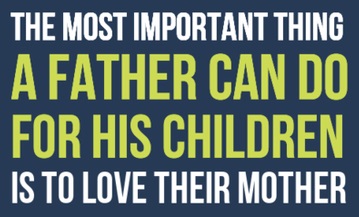 It may be counter-cultural today to say that dads and moms are important. Each brings a very unique dimension to the parenting equation that influences a child’s ability to navigate through life. Men and women have been lured in to thinking they are mutually interchangeable but they are not. Recent research in psychology, neuroscience and epigenetics validates what has been common sense for previous generations - that moms and dads are uniquely important beyond the obvious reasons.
It may be counter-cultural today to say that dads and moms are important. Each brings a very unique dimension to the parenting equation that influences a child’s ability to navigate through life. Men and women have been lured in to thinking they are mutually interchangeable but they are not. Recent research in psychology, neuroscience and epigenetics validates what has been common sense for previous generations - that moms and dads are uniquely important beyond the obvious reasons.
In her book, “Being There: Why Prioritizing Motherhood in the First Three Years Matters” psychoanalyst Erica Komisar says that “babies are much more neurologically fragile than we’ve ever understood.” She advocates a 1000-day maternity leave to maximize a mother’s physical and emotional presence with her newborn. “Every time a mother comforts a baby in distress, she’s actually regulating that baby’s emotions from the outside in. After three years, the baby internalizes that ability to regulate their emotions, but not until then.” The regulatory mechanism is oxytocin – “Mothers produce it when they give birth, breastfeed or otherwise nurture their children. The more oxytocin the mother produces, the more she produces it in the baby” by communicating via eye contact, touch and gentle talk. The baby’s brain in turn develops oxytocin receptors, which allow for self-regulation at a later age.
Listen my son to your father’s instruction and do not forsake your mother’s teaching. … For I too was a son to my father, still tender, and cherished by my mother. – Proverbs 1:8 & 4:3. A father’s instruction and a mother’s teaching provide pillars for life. A dad’s discipline is important but even more so is a mother’s tenderness, the unique dimension of nurturing she provides particularly during the early years. Proverbs provides a powerful reminder of how we are to navigate through this world – be counter-cultural.
In an interview with WSJ, Ms. Komisar states that women produce more oxytocin than men do, which answers the obvious question of why fathers are not as well-suited as mothers for this sort of ‘sensitive, empathetic nurturing.’ Fathers produce a ‘different nurturing hormone’ known as vasopressin, ‘what we call the protective, aggressive hormone.’ Children, especially boys, need that paternal nurturing to learn to control their aggression and become self-sufficient. But during the first stages of childhood, motherly love is more vital.
Prayer guide: Lord, thank You for Your design for mankind – male and female uniquely made to become husband and wife in marriage and mature to father and mother in family. I hear the call is to be faithful by prioritizing physical presence in the home, staying engaged emotionally and leading spiritually by example. Strengthen me for this journey as a dad and embolden me to be counter-cultural in this world. Amen.
A faithful father is counter-cultural by design and compliments the mother of his children.